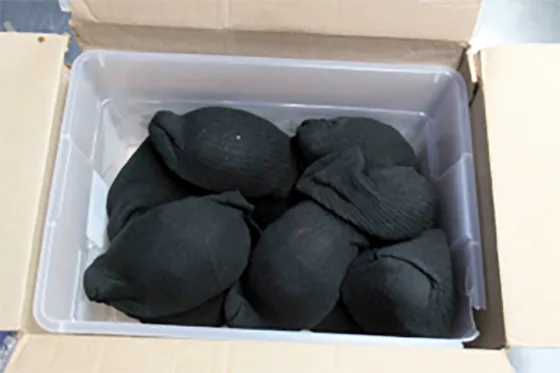The Eastern box turtles, cherished for their unique markings and gentle demeanor, enjoy protection under international agreements and federal legislation. Despite their protected status, they remain a coveted presence in pet markets across the United States and beyond. Remarkably, some enthusiasts took to unconventional measures, like housing them in socks, to ensure their quiet companionship.
A man from China named Sai Keung Tin, aged 53, has found himself in legal trouble for his involvement in smuggling protected turtles into Southern California. According to prosecutors, Tin has been charged with four counts of unlawfully exporting merchandise after small turtles, concealed within socks, were intercepted in packages destined for his address. The intercepted parcels were discovered last year at a U.S. mail facility in Torrance.
The turtles, identified as eastern box turtles, were ingeniously kept inside socks to stifle any potential noise during transportation. These turtles are notable for their diminutive size, typically reaching about 6 inches in length, and for their vibrant and intricate shell patterns. Furthermore, they boast an impressively long lifespan of approximately 100 years.
Despite their small size, eastern box turtles are protected by both international and federal laws. They fall under the safeguard of the Convention on International Trade in Endangered Species of Wild Flora and Fauna (CITES), which was ratified in 1975. This international treaty obligates participating countries, including China, to enact measures for the protection and conservation of endangered species like the eastern box turtle.
Tin’s case underscores the ongoing efforts to combat illegal wildlife trafficking and underscores the importance of international cooperation in preserving endangered species.

Tin faces charges in connection with the discovery of 40 turtles found in four packages intercepted at the Torrance mail facility in June 2023, as detailed by a U.S. Fish and Wildlife Service special agent in an affidavit accompanying the criminal complaint.
Among the turtles, sadly, one was found dead, but the remaining ones were alive. The affidavit explained that smuggled turtles are often bound in socks to prevent them from making noise and to safeguard their shells during transit.
According to the affidavit, Tin is linked to Kang Juntao, who was involved in smuggling at least 1,500 turtles from the U.S. to Hong Kong between 2017 and 2018. The affidavit revealed that the estimated value of these smuggled turtles in the pet trade amounts to around $2.25 million.
Middlemen for Kang reportedly sent turtles to Tin’s address in Hong Kong, from where they were further smuggled to mainland China, the affidavit outlined.
Kang’s illegal activities came to light when he was arrested in Malaysia in 2019 and subsequently extradited to the U.S. In October 2021, Kang was sentenced to more than three years in prison for money laundering, as confirmed by the Justice Department. Kang’s smuggling operation involved five species of turtles, including the eastern box turtle, as stated by the Justice Department.
Despite Kang’s arrest and prosecution, the affidavit noted that packages continued to be sent to Tin and intercepted in Torrance, demonstrating ongoing illegal activities.
Tin’s apprehension occurred on February 25 in New York City, upon his arrival at John F. Kennedy International Airport, according to officials.
As of Monday afternoon, online court records did not show an attorney representing Tin in connection with the California case who could speak on his behalf. Although a federal public defender was listed in New York, the case has been relocated, and that attorney has yet to respond to requests for comment.
